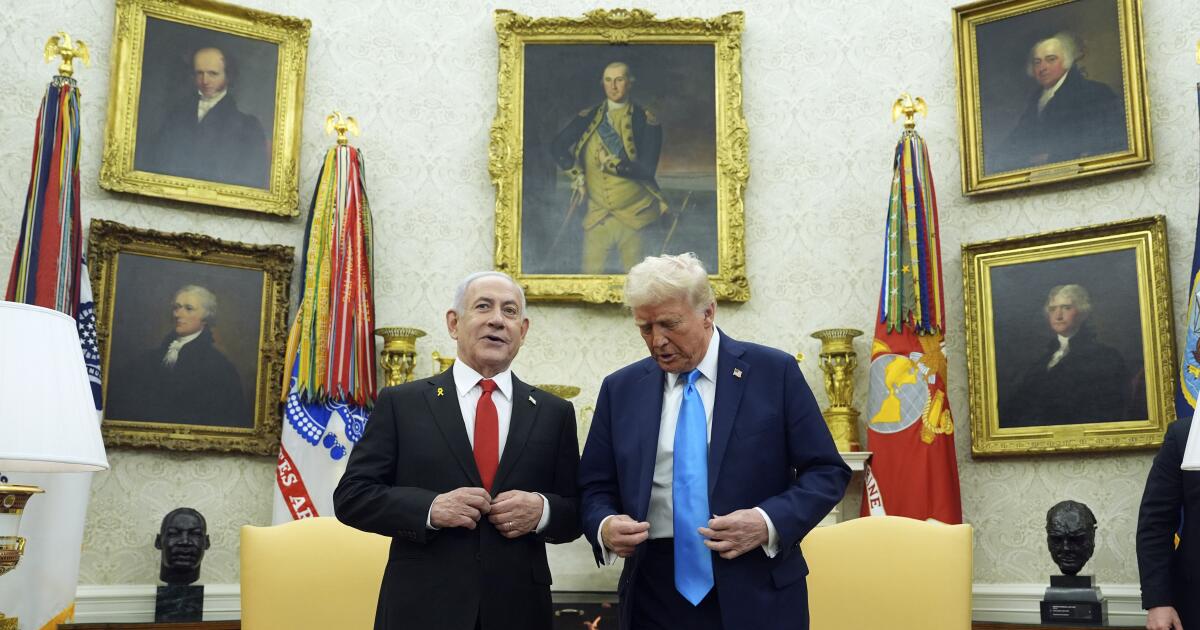Politics
Trump’s Middle East Peace Plan Faces Skepticism Amid Ongoing Conflict

The recent unveiling of Donald Trump‘s 20-point peace plan for the Middle East has sparked a debate filled with skepticism and concern. The plan, which aims to address the long-standing conflict, has drawn mixed reactions from the public and experts alike, raising questions about its potential effectiveness in achieving lasting peace.
Public Reactions Highlight Concerns
In a letter addressed to the editor, June Maguire from Mission Viejo expressed doubt about the plan’s viability, questioning the United States’ longstanding support for Israel. Maguire noted that this support often intertwines with Prime Minister Benjamin Netanyahu‘s domestic interests, potentially undermining American priorities. She highlighted the rising international accusations of genocide against Israel, suggesting that the U.S. risks being seen as complicit in the violence.
Another letter from Saif M. Hussain in Woodland Hills echoed these sentiments, emphasizing the destruction in Gaza and arguing that Israel should bear the financial burden for the devastation it caused. Hussain argued that expecting other nations to contribute to rebuilding efforts is unjust, advocating for Israel to be held accountable for its actions.
Mixed Perspectives on Progress and Accountability
The reactions continue to vary significantly. Steve Watson from San Clemente viewed Trump’s actions as a step towards reducing violence, noting that under his leadership, there have been significant casualties, including approximately 64,000 Gazan deaths. Watson remarked on the hope that this plan could lead to a reduction in hostilities, particularly with Netanyahu seemingly acquiescing to pressure regarding military and financial support.
Conversely, Richard Ellison from Pasadena acknowledged Trump’s role in facilitating a ceasefire and the return of 20 Israeli hostages. Despite this, he criticized both Trump and previous president Joe Biden for their contributions to what he described as an ongoing cycle of violence, stating that their administrations have fueled the Israeli military efforts.
The complexities of the situation are further highlighted by Leonard Zivitz from Fullerton, who raised concerns about Hamas and its ability to govern Gaza. Zivitz described Hamas as untrustworthy, pointing out that the group has been implicated in violence against its own people while failing to acknowledge Israel as a legitimate state.
The discourse surrounding Trump’s peace plan reflects deep divisions in perspectives on accountability, the role of the United States in the Middle East, and the path to future peace. As the plan is set to unfold, the world watches closely, hoping for a resolution that could finally bring an end to decades of conflict.
-

 Science2 months ago
Science2 months agoUniversity of Hawaiʻi Joins $25.6M AI Project to Monitor Disasters
-

 Business2 months ago
Business2 months agoForeign Inflows into Japan Stocks Surge to ¥1.34 Trillion
-

 Top Stories2 months ago
Top Stories2 months agoBOYNEXTDOOR’s Jaehyun Faces Backlash Amid BTS-TWICE Controversy
-

 World2 months ago
World2 months agoBoeing’s Merger with McDonnell Douglas: A Strategic Move Explained
-

 Top Stories2 months ago
Top Stories2 months agoCarson Wentz Out for Season After Shoulder Surgery: Urgent Update
-

 Top Stories2 months ago
Top Stories2 months agoMarc Buoniconti’s Legacy: 40 Years Later, Lives Transformed
-

 Entertainment2 months ago
Entertainment2 months agoSydney Sweeney Embraces Body Positivity Amid Hollywood Challenges
-

 Lifestyle2 months ago
Lifestyle2 months agoKelsea Ballerini Launches ‘Burn the Baggage’ Candle with Ranger Station
-

 Health2 months ago
Health2 months agoInnovative Surgery Restores Confidence for Breast Cancer Patients
-

 Sports2 months ago
Sports2 months agoSteve Kerr Supports Jonathan Kuminga After Ejection in Preseason Game
-

 Entertainment2 months ago
Entertainment2 months agoZoe Saldana Advocates for James Cameron’s Avatar Documentary
-

 Science2 months ago
Science2 months agoChicago’s Viral ‘Rat Hole’ Likely Created by Squirrel, Study Reveals









